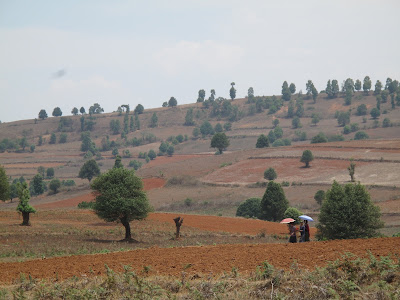The temples: Bogon, the seat of an ancient capital. Stupas in various stages of disrepair litter the Irrawaddy floodplain here. History is literally extruded from the ground all around us. Shards of ancient pottery, a secret staircase leading to a panoramic view, Buddha images perched among guano and darkness. This is an auspicious place.
The drive: thumb sore from feverish rolling up and down of the passenger seat window in this small stuffy Burmese taxi. Young smirking children, hidden behind piles of stones or parked rusty trucks leap out ready to fling buckets of water onto and into unsuspecting cars and motorbikes. It is the Buddhist New Year, which means water festival, which means the few days of the year where all can revel in hydrological mischief.
We are cruising up the western edge of the Shan plateau, bound for the (still) idyllic, (once) colonial mountain retreat town of Kalaw in western Shan State. Once past 3000 feet high, pine trees take over and wash the hillsides with green and brown needles. This place feels halfway between southeast Asia and India - tiny tea shops selling samosas fortify each street corner.
The trek: landscape is more of a crust. Dessicated rolling hills - a patchwork of burnt red and orange and brown geometrically abutting one another. Terraces where there will soon be rice. The whole of the landscape between Kalaw and Inlay Lake was groomed by a human touch. Ox carts create perfect till lines through soon to be vegetable patches. The Anthropocene is upon us, here as much as anywhere else.
We walk along limestone cliffs and past men leading water buffaloes between rice terraces. A village dog adopts us, accompanying us for both days of walking. Local woman, brushing long grey hair soon to be covered by traditional head scarves, invite us in for green tea and spongy sugar cane rice disks.
The villages are tidy and serene, far from the drunken punk rock water hose stages of the cities. Few chickens and ducks litter the alleyways of the 3 street town. I sat in a slumped food coma, sweating in some rays of afternoon light, while the local medicine woman, at whose house we were resting, counts beads and repeats soft Buddhist prayers beside her snoozing young daughters.
As the sun droops over the hills, we reach the monastery that is our place of rest for the evening. Micro-monks - small children in small maroon robes rove the place - doing chores and playing games and staring intently in front of the head monk. The monastery is hollow, with old dark red floorboards and lofty ceilings. Something that has existed as is for years and will continue to.
The lake: a sunbaked skim over Inlay Lake, a giant volcano-caused body of water in Shan State, draining into the Mekong watershed. Fishing communities live on the lake - in it, above it. Front porch staircases are partially removable for the rising lake levels in the rainy season. This is some kind of Venice of Asia. Men practice a graceful leg rowing technique to free up hands for fishing. Floating gardens soak up light above and water below.
The city: we get to the train station on the outskirts of town trying to buy tickets. The only foreigners in sight... they don't now what to do with us. Eventually we are escorted into the office, where rusty old British equipment monitor the position of incoming trains with tiny blinking and flashing lights. After some funny conversation with an English speaking Burmese gentleman who happened to be on his way as well, the narrow gauge canary orange cars pull up. Riders race to load and unload their wares and bags of produce before the train creaks forward.
Yangon is pulsing with sweaty tropical energy. Only weeks ago, the first free election in decades occurred here and around the country - finally winning for Aung San Suu Kyi and the National League of Democracy 43 of the possible 45 free legislative seats. People are excited, inspired... life is changing fast for them. After years of being closed and quieted, pushed aside by the military regime, they suddenly feel that have some voice. It seems not loud or brash, but humbly hopeful and inspired. Many people wear Suu Kyi's pin on their shirt, they bring up the recent political visits from Hillary Clinton and David Cameron, they can see a path towards a life of expanded potential. They feel connected, relevant, like new citizens of a vast world that they have until now been totally excluded from.



















